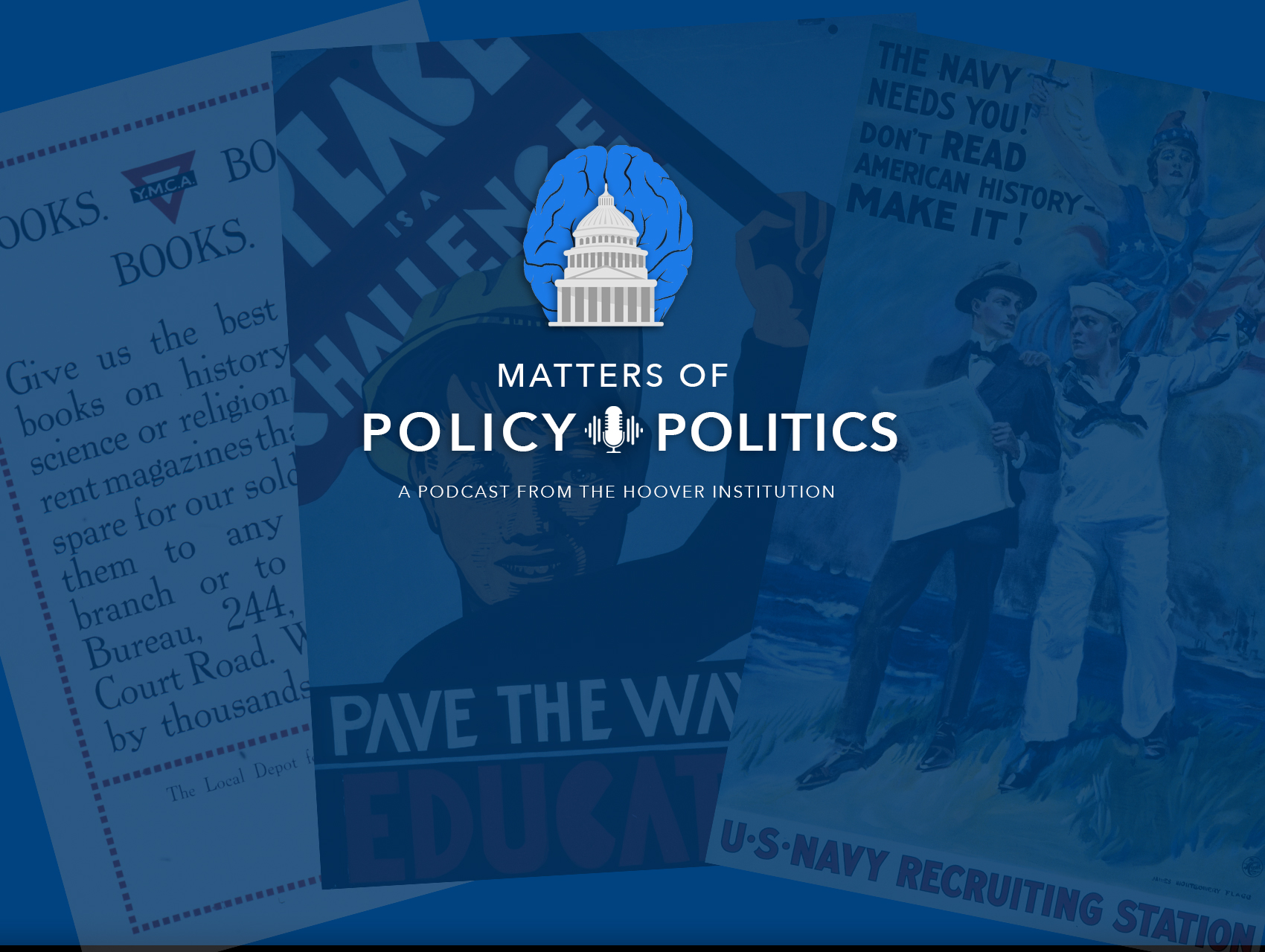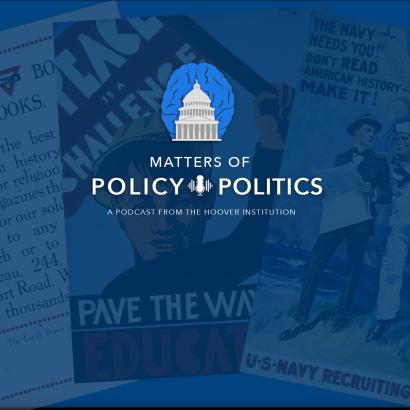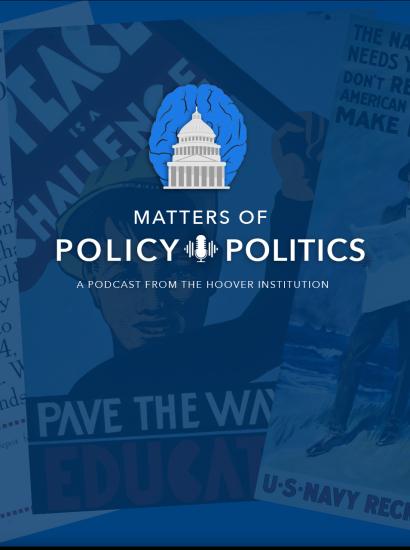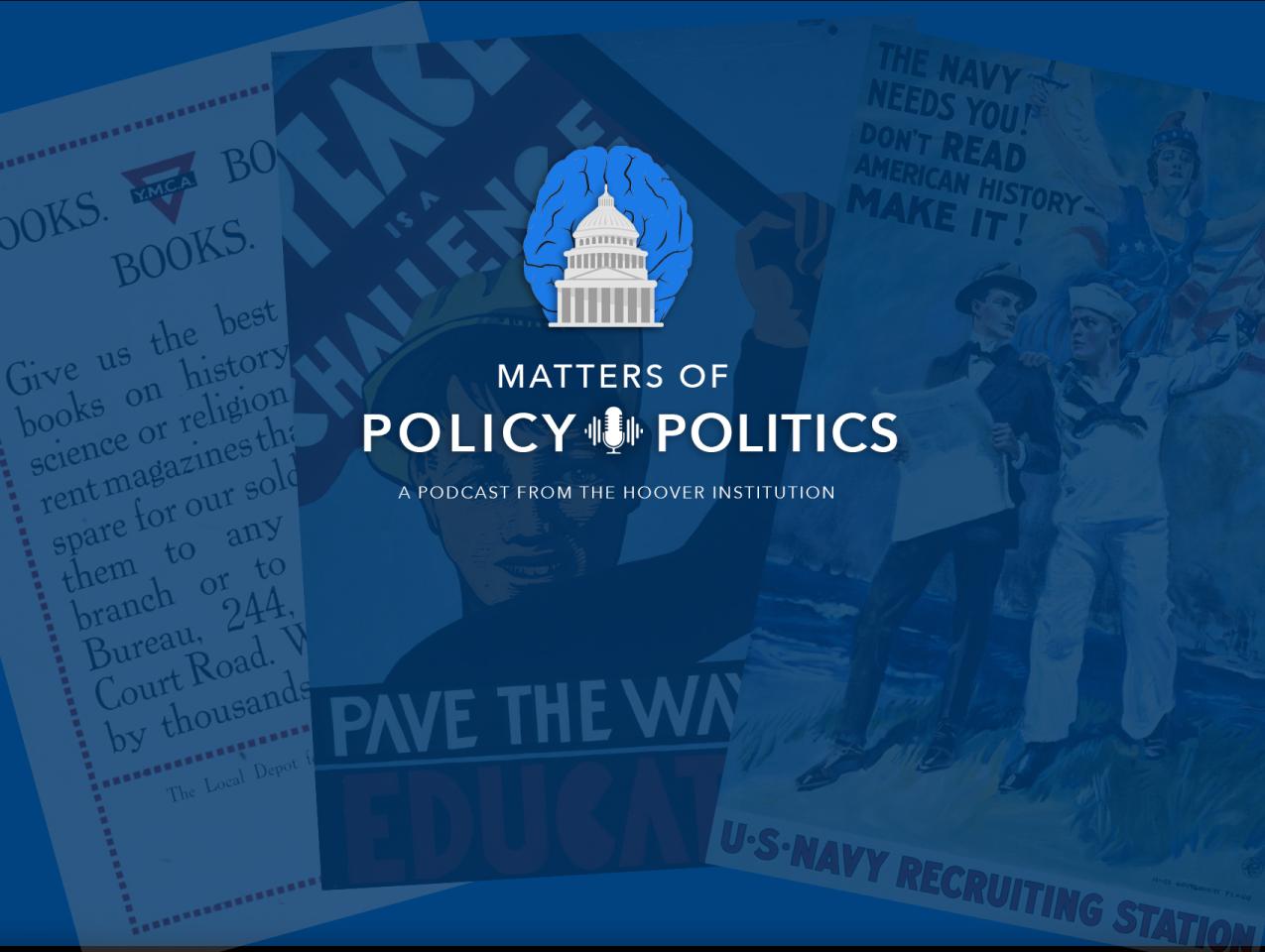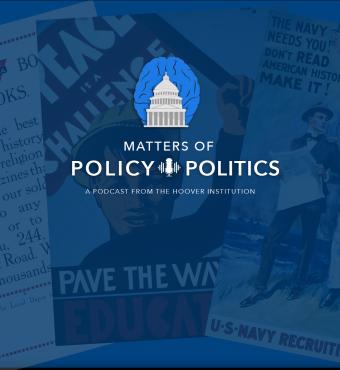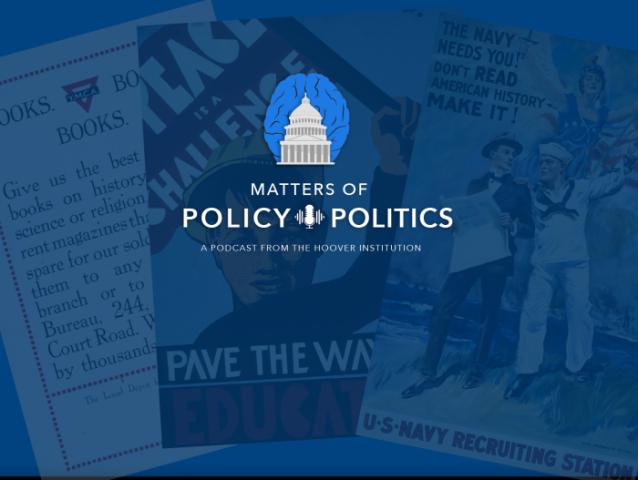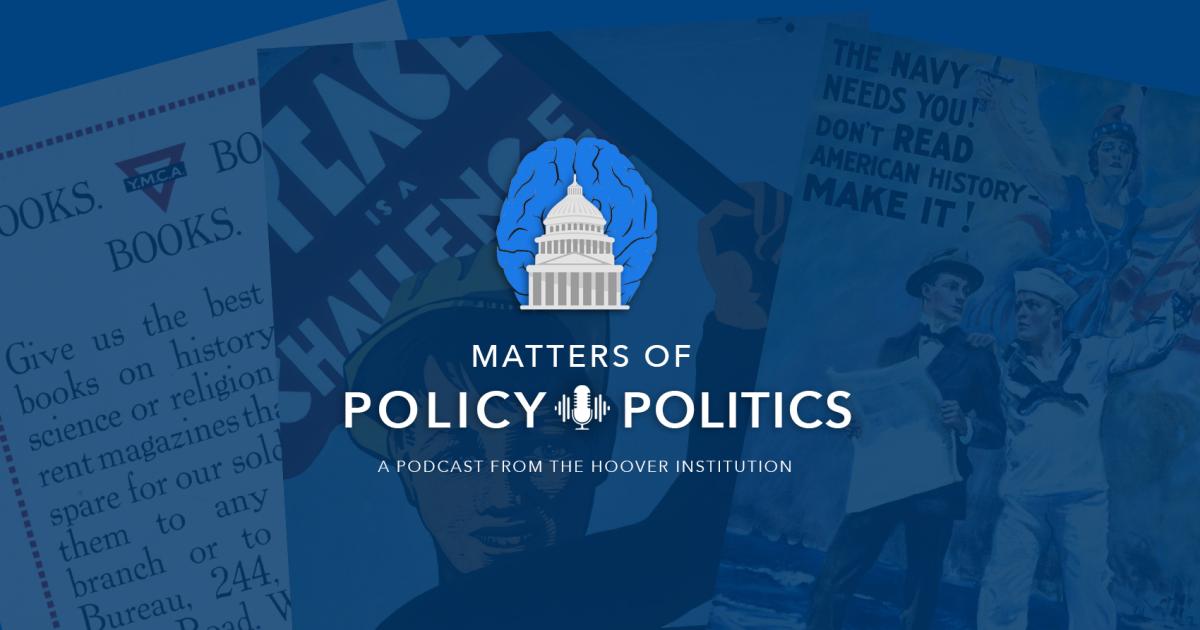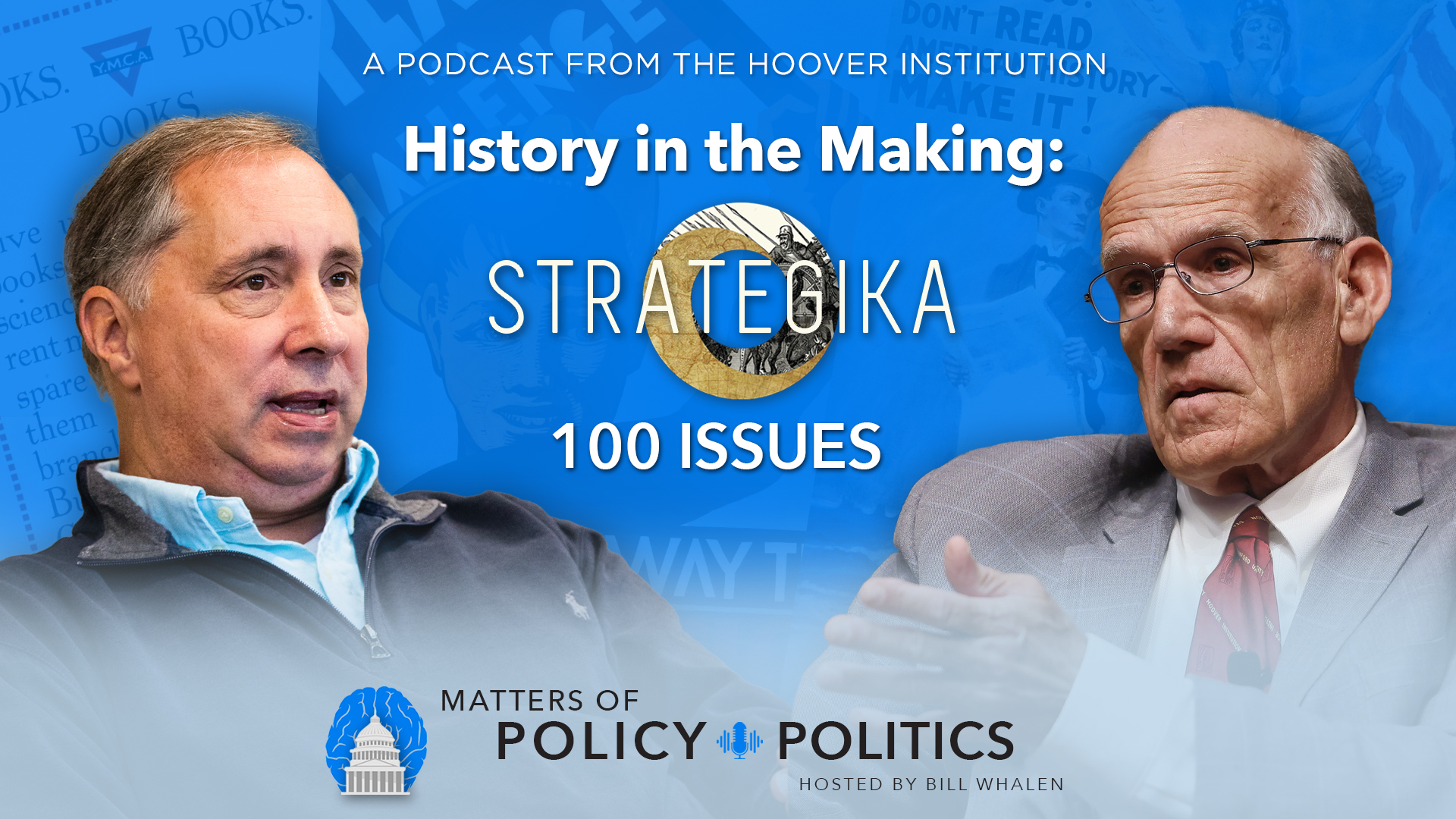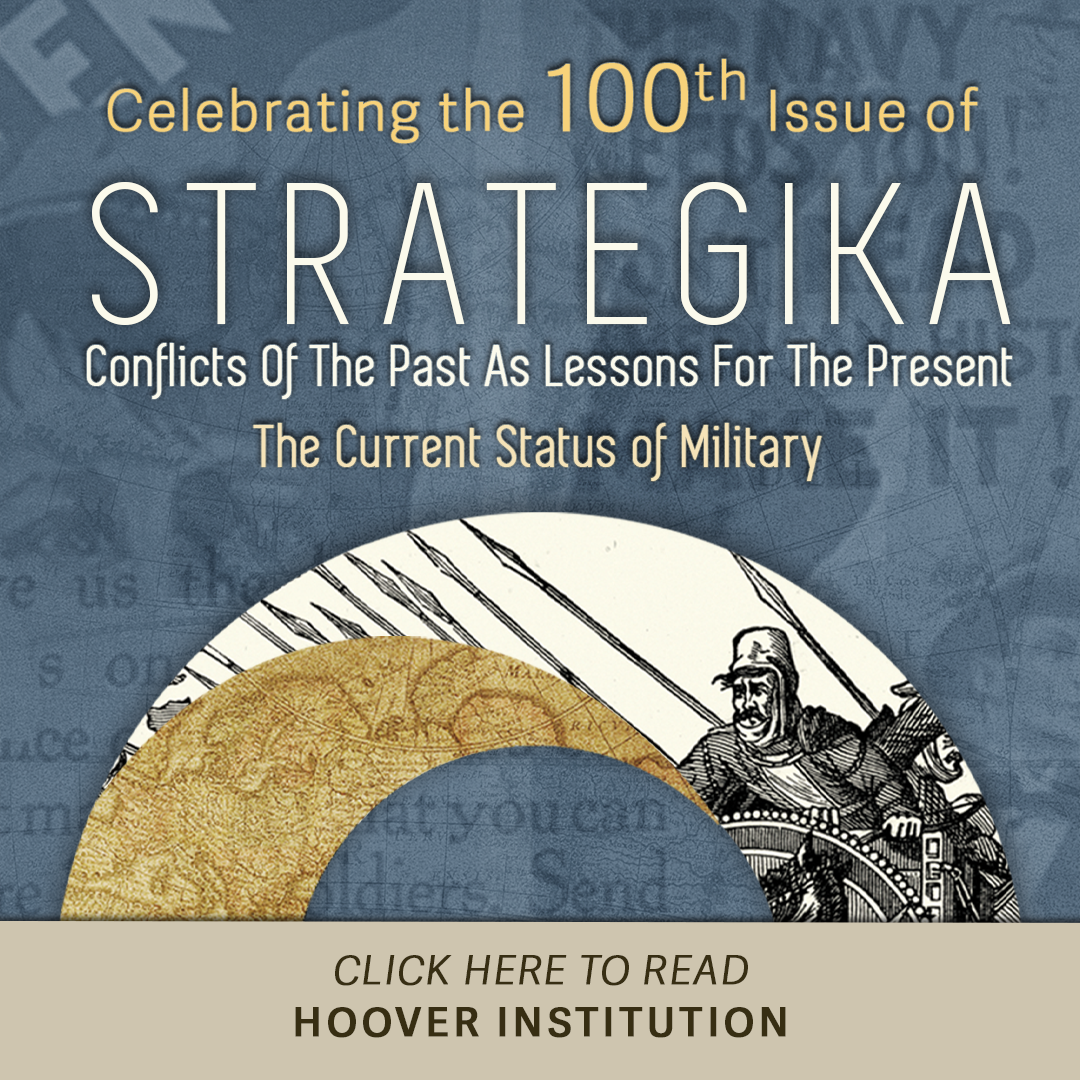- History
- Military
- Revitalizing History
For the past dozen years, Hoover’s online publication Strategika has examined contemporary conflicts and national security challenges by assembling academics of varied thought to re-examine past struggles. On the occasion of its 100th issue, historian Victor Davis Hanson, Hoover’s Martin and Ilie Anderson senior fellow and the man tasked with bringing the publication to life, discusses the institution’s growing commitment to the study of history (Hoover’s having a compliment of historians rivaling that of world-class universities) and how a Strategika-like approach explains complicated conflicts in Ukraine and Gaza. Also discussed: how Victor’s passion for military history stems from his male ancestors’ involvement in two world wars, his thoughts on how best to introduce young learners to classical opuses, plus the problem of university history departments discouraging intellectual diversity.
>> Bill Whalen: Foreign August 14, 2025 and welcome back to Matters of Policy and Politics, a Hoover Institution podcast. I'm Bill Whalen. I'm the Virginia Hobbs Carpenter Distinguished Policy Fellow in Journalism here at the Hoover Institution. If you're watching this on Hoover's YouTube platform, you probably notice we're doing things a little differently today.
I'm not sitting in my office at the Hoover Institution. I am instead high above Stanford University. I'm on the 11th floor of the Hoover Tower, looking down on Stanford, so to speak, the Stanford University campus. But I'm here today and I have the high honor and privilege of being joined by Victor Davis Hanson.
For those of you who don't know who Victor Hansen is, let me briefly explain. Victor is the Martin and Eli Anderson Senior Fellow here at the Hoover Institution. You've probably seen him on television at some point. Perhaps you listen to his eponymous podcast, which is the Victor Davis Hanson Show.
What else about Victoria? Author of numerous books, he is a prolific columnist. I can't escape his presence, which I'm going to ask him about in a minute here. What I call Victor Nation here at the Hoover Institution. Victor is the chair of Hoover's Working group on the Role of Military History and Contemporary Conflict.
He's a participant in Hoover's Applied History Working Group and the institution's Global Policy and Strategy Initiative. He is also responsible for the creation of a publication called Strategika, which recently hit a milestone. It's now published. It had 100 issues published. We're going to talk about as well.
Victor, it's great to see you.
>> Victor Davis Hanson: Nice to be here. Thank you.
>> Bill Whalen: So I don't know if I told you this before, but wherever I travel, I can't escape you. Now, part of this is my own fault. I listen to your podcast, which is out I think three times a week if I'm not mistaken.
>> Victor Davis Hanson: Four.
>> Bill Whalen: Four times actually. My God, you're busy. But when I travel, I have encounters with Victor Davis Hansen's second hand encounters. So this began a couple of Novembers ago. I was flying back from Florida and sitting next to me on the plane was a childhood hero of mine, a baseball pitcher named Jim Palmer, World Series champion Hall of Fame pitcher.
I went into complete fanboy mode with him. It was ugly from his standpoint, I imagine. But at some point he turned the conversation and said, what do you do for a living? Said, well, I work at a think tank at Stanford University, the hoover institution. Pause. 1, 2, 3.
Do you know Victor Davis Hanson? Last Saturday, Victor I was on a ride to the airport In South Carolina, Don the driver. Shout out to Don if you're watching. Don asked me the obligatory, what do you do for a living? Think tank, Hoover Institution, Stanford, 1, 2, 3.
Do you know Victor Davis Hanson? So this is all secondhand stuff. So what is it like for you firsthand to be VDH and probably get encountered in airports and have groupies come up and talk to you?
>> Victor Davis Hanson: Yes, but 1 out of every 10 is not so nice.
>> Bill Whalen: Right.
>> Victor Davis Hanson: Because we're in polarized times. And, you know, I. I was pretty much left alone until maybe three or four years ago. I think has a lot to do with a podcast. That genre has taken off in a way that maybe even being on Fox. But we do get people that show up at our house out in the country.
That's kind of ambiguous. And I've been swatted by the sheriffs. They had a call that there was an armed intruder, which was false, of course. Yeah, I've had all my bank accounts looted by hackers, so there's a downside to that, too. But most people, nine out of 10, are very friendly and, you know, very friendly.
>> Bill Whalen: Right. Let's talk about strategic adventure, but let's back up for a second and let's talk about the Military History Working Group, which you chaired from the beginning, and take us through how this began. My understanding is that this goes back to about what, 2012, 2018. The late John Racian, who was a director of the Hoover Institution before Condi became the director.
He brought you in the office and he talked about this idea. Was there a void in this kind of history at the time? Was nobody doing this, or was John thinking more course correction in terms of offering a kind of alternative approach to history?
>> Victor Davis Hanson: Well, this was in the period before we had the luminaries like Andrew Roberts and Neil Ferguson, Stephen Kotkin, Frank Decoder.
There was a few of us, but not very many. And John casually said to me, we need. He appointed me in 2002, but I didn't arrive till 3, 4. And he said, you don't have a program and you're writing a lot, but this is called the Hoover Institution on War, Revolution and Peace.
And we have nothing on war. And I'd like you to start a program. And I don't want opinion journalism politicos, and I don't want academics only. I want you to get a broad cross-section. So we discussed it. Generals, admirals, active retired military diplomats, former government officials, Hoover fellows, as many as we could.
Right. From different fields, but had an interest in history, public intellectuals. And he said, I don't want them all to agree with you. So I we had paleo cons, neocons, neo isolationists, interventionists, liberal people. And then he said, now we have to pay for it. So you and I are going to go traveling.
So for a year we traveled, flew all over the country, partly for official Hoover business, but partly we were raising money for the Hoover, the new program on military history and contemporary conflict. So that's how it started. And then I said, well, we have these task forces, but we don't have a lot of online magazines.
So that was before really online had taken over. So he said, okay, you go ahead and do it. And then he said, you're going to need an assistant. So He gave me an assistant and David Berkey came on two years later.
>> Bill Whalen: I think David Burkey is a research fellow.
>> Victor Davis Hanson: He's a research fellow.
>> Bill Whalen: He has a background in classics.
>> Victor Davis Hanson: And he's. Yeah, I have a prejudice for classical philologist. He has a PhD from Yale in Classics. And then we brought Bruce Thornton, who has a PhD in classics from UCLA. And now we have another research person.
Morgan hunter has a PhD in classics from UC Berkeley. And then Barry Strauss is a member. He has a PhD in classics from Yale. So it got kind of out of hand, the classics lobby. But I was a good. So it was very lively group. And no sooner had John said this than he just happened to come in the one time.
There was a real altercation. I mean, a fiery exchange. We had some people who were very strong about the Iraq war. We had some people that said it was an ungodly disaster that morphed into, well, you've never served the military and you have. And it was really kind of intellectual.
But John walked in right during that, and he called me in and said, no, no, no, nothing goes leaves your room, but you have to be a stronger force and moderate it. So we were civil, right? And that was the only time in, since the life of it, in the 13 years that I had encountered that.
It was just the time that he came in.
>> Bill Whalen: And I think John had two very important mandates, Victor. One was he wanted an assembly of opinions. He didn't want me. He didn't want four people all saying the same thing.
>> Victor Davis Hanson: No, he did not.
>> Bill Whalen: Oring it's repetitive.
And secondly, I think he told you, keep it simple.
>> Victor Davis Hanson: He did. He said, we don't want. When you have the strategic, what are you going to do? And I said, well, we'll have a historical backgrounder. That meant if it's on the Ukraine war, somebody would do 2,000 words on the history of Ukraine, and that's borders and the diff and then some.
Someone. Then he said, well, can't we get different views? I said, yes. So we'll have someone who thinks we're doing too much, someone thinks we're doing too little. And then he said, well, we have polls at Hoover. We have all. So I want a poll. So we did the poll and we had research.
So we kept that model that he and I worked out every issue, all until this current 100 issues. And then he said something I'd forgotten. He said, I don't want it this morbid. And the problem with these task forces or these sinners four is they start out and they're all excited and they have a journal and then it's supposed to be out every month and then it's every three months and then three years later it's gone, right?
So he said, if you're going to do this, as long as you're at Hoover, this is going to be sustained. So I said, okay. And it has.
>> Bill Whalen: How'd you come up with the title? How'd you come up with Strategika?
>> Victor Davis Hanson: Well, that is a Greek word because obviously strategy is the English derivative, but strategos in Greek means a general with a k rather than the Latinized C.
So then the neuter plural is general, like things. It doesn't really mean an ancient Greek strategy, but the things that generals are worried about. So we just use the neural plural, Strategika. And I searched all over the Internet to see if anybody had ever used that term as an English word with the K there.
And I hadn't found anybody. So, and he liked it. John did.
>> Bill Whalen: How do you come up with topics, Victor, for each issue? Is it Newtonian? Does an apple land on your head? Do you have some epiphany when you're working the farm where.
>> Victor Davis Hanson: Well, what I do is David, who is the managing of her.
He calls me and says, now we gotta get the issue. Victor, what do you want to do? And then I ask him, can you. I give him three or four ideas. And I said, now I want you to search and see if there's anything tangential. We've done on that before because it's been a hundred issues.
So he comes back and then the second criterion is to participate in the big session. Everybody has to submit articles on three or four topics. So we'll. If we have visitors to just to come, you have to do that. So we might have a corpus of 80. So then I try to see how during the year I can get a topic that also can draw on Those to be add ons.
But usually I try to do two things. One is, have we discussed this before? And two, does it have contemporary relevance? And we tried it. I've looked back at them. We don't really repeat unless it's something like the Iran, a nuclear bomb or that has changed so radically over the years.
But we do that and then we go through the names of everybody and I say these people and then David will tell me, well, this person hasn't contributed enough or this is too much. So then we whittled them down. And then I do the poll, I do the research questions, and then he and I decide of the backgrounder and the pro and con, which person's gonna do which one.
And then he is in charge of contacting them. And sometimes I do, but he does it mostly. And then he gets the illustrations from the archives, posters and things. And then his job as managing editor is to make sure that it's on time. And then I'm working on the next issue, the topic, the people who should be on it.
And then we have a research fellow, Bruce Thornton, who edits them along with David. So it's three of us produce it.
>> Bill Whalen: Issue one of Strategika, Victor, came out on April 1st, 2013. Do you happen to know the topic?
>> Victor Davis Hanson: No.
>> Bill Whalen: Bashar al Assad. What do we do with a problem like Bashar al Assad?
This is the beauty of history, because here we are now, 12 plus years. Later.
>> Victor Davis Hanson: And there's no.
>> Bill Whalen: Where's Mr. Osad right now?
>> Victor Davis Hanson: Well, he's dead and his son is somewhere practicing as an ophthalmologist in Russia, I'm told.
>> Bill Whalen: Right. So times change. It's very funny.
I do the Goodfellow show, which Eric, by the way, long overdue for an appearance. My friend, we always have had the fear of running out of things to talk about. But I don't know, Victor, if we're in the age of hyper history, if you will, but maybe it's just a function largely of Donald Trump and the sleepiness and the previous president, but it seems like news and history are just kind of like water coming out of a fire hydrant.
>> Victor Davis Hanson: It is. When I started studying history, it was the disagreements in history were not as sharp as they are now. They were all within certain parameters, but there was not people who said, two big things have changed. One is that you accepted evidence and you could disagree about the evidence, but you were trained as a historian, so you knew you had the tools to decide whether the evidence was valid or not.
Today everything is out the window. You can bring in anything and there's no rules. Second thing is, and this has kind of been good, I think is if you in the early days of the Internet had a historical problem and you googled people, it was mostly academics, people that had PhDs in history or classical language, something like that.
Today it's what they used to call, when I was growing up, Luce libre a free for all. You know what I mean? It was just anybody can get on and if they can explain a topic better or they're more photogenic or they're better looking or more they, they'll get that.
And then the good side of that is you get fresh blood from people with different experiences. The bad side of it is there's no commonly agreed tools. So if you're in classical history, for example, before you can write your thesis, you've got to take 12 seminars. You have to know French and German, a reading ability.
You have to be fluent in Latin and Greek. But more importantly, you've had to be. You've had to take courses in and be examined in on your PhD. So you have to know if you have a passage with Xenophon, is it more or less reliable than Herodotus vis a vis Thucydides?
Where did Thucydides have as sources? Can you trust them? What about late authors like Plutarch, who. And it was called this fancy German word quellenforschen. Find the sources of the extant history. And that gave everybody legitimacy and competency. Today I'll see things written on the Internet about ancient history that are just absurd.
And the person has no idea that this particular source that he's using is completely fabricated or not to be trusted. So that's the problem. But the Internet, it's still a 51% proposal that finally you'll have, people will say, wait a minute, this is wrong. And then they'll pile on.
And so there is some kind of audit, but it's a much wider open experience.
>> Bill Whalen: It's a busy time to talk about war. There's obviously Russia and Ukraine. There is the situation in the Middle East. There's always the threat of something maybe happening between China and Taiwan. There are conflicts in Africa that don't get much attention, or there's a potential for something to happen in a place like Venezuela.
Let's look at a couple of these conflicts to make sure and put them in a strategic lens, if you will. First of all, Russia and Ukraine. So we're doing this podcast a day before the summit, or whatever they're calling it now in Alaska, between Putin and Trump. If he were to analyze the Russia, Ukraine situation, Victor, and did it through Strategica, where would you go?
Would you go back to 1979 and Afghanistan? Would you go back to 1939 and Finland? Or would you go back maybe deeper into tsarist history? Because. Because one thing we know about Putin, he sees himself where he wants to be, he wants to be a czar.
>> Victor Davis Hanson: Well, everything, there is a reason for everything.
Even if the reasons are evil or they're wrong. So what we do is. So Russia has been aggressive toward Ukraine. Why is that? And we go back to, let's say, ancient history, and you find out that Russia had territorial interest and had absorbed parts of Ukraine which over their history, off and on Crimea, I think since 1787, the Donbass.
How did the Donbass become Ukrainian? That was a inter Soviet jurisdictional matter. And then you find things, and this is the discussion in Strategika, as somebody will say, well, wait a minute, Western Ukraine was part of Poland. And it was Roman Catholic and Polish-speaking and for a thousand years, till 1939, when the Molotov-Ribbentrop Pact, Russia invaded Poland from the east.
They annexed it, Stalin would not give it back at Yalta or Potsdam. And so they ethnically cleansed everybody out and it became a Soviet state, all of present day Ukraine. And that territory was compensated by ethnically cleansing 13 million Germans out of Pomerania and East Prussia. And that was New Poland.
And then that makes it. The boundaries become more fluid and ambiguous and the historicity becomes more. Doesn't mean you'll come to a different outcome. But we try to do that with all of these and we try to, because strategic, it does mean generalship in these discussions. What was Putin thinking?
So somebody asked me the other day, are we gonna get a deal between Trump and Putin? And I said, if you're Putin, this is obviously a big mistake. You've lost a million dead, wounded, missing or captured. You went in there saying you were going to do certain things.
They were never going to be in NATO, Ukraine. So you can say you got them out of NATO, but they never were going to be in it. Nobody had the military wherewithal to expel you out of the Donbas or the Crimea. You had some legitimacy on your claims, so then the question was, at what magical point westward, where will you have the DMZ?
So when you're thinking from Putin's point of view, at what point do I have to go west so I don't get shot by the military or the oligarchs? Because this was a disaster and I've got to get something more than I had before I started. And then you start to see what he, what his motivations will be.
And at some magical point, he will grab it because he thinks he can take it back and say that I enlarge Russia on the Ukraine side. It's in the Constitution, they're not allowed to give up territory. So they're thinking, did we ever have the ability to get back Crimea on our own or Donbas, no.
Do we have the ability to stop an overextended Russian army, yes. Where is the most realistic defensible line? And between those two lines, that's what it's going to be negotiated on.
>> Bill Whalen: Issue 21 of Strategika, February 2015, What Makes Putin Run, your author suggests the following. One, tougher sanctions against Russia, two, lethal aid to Ukraine, and three, a PR war against Russia highlighting Russian kleptocracy.
>> Victor Davis Hanson: Yeah.
>> Bill Whalen: It's kinda eerily predictive.
>> Victor Davis Hanson: Yeah, we have very brilliant people in that group. One of the things I thought was very important. I don't want to mention names, but John Racian said to me, this person used to work at Hoover. I had to let him go because he was too controversial.
I want him back. This person. You bring the names. This guy's kind of crazy, but if you can handle him, go ahead. Right. And so if you look at the original group and the people that are in it, they all had a reputation for being very brilliant, somewhat individualistic, somewhat pariahs or mavericks.
And so we tried to bring in. And then he said to me, you've been writing. At that time, I think I'd written 20 books. He said, what's your attitude about people who've attacked you? And I said, I don't care. I said, great, so bring in people. So the first meeting, I looked around, I said, that guy wrote an unfair review of me.
That guy shouted at me at a department. That guy was in an elevator with me and wouldn't speak. So they're all in there, and that was kinda good because it was very lively then.
>> Bill Whalen: Bunch of mad monks.
>> Victor Davis Hanson: Yes, everybody. And then people would come to me and say, he's on the.
On the same menu as she's on the same menu. And they have both been very unfair. They screamed at me at a conference, and I said, that's the rules. If you want yes men in an academic conference, we can do that. But this way everybody knows they can say whatever they want, and you can't repeat it outside the room.
And it's been very lively, and we've had a lot of guests, a lot of the donors come and love it, but it's getting. We have to make a decision because we started with a 20-person twice a year. We had 20 in one group and 20 and then it got to be 40.
And so I think now we have 90 to 100 people come by invitation and it's a huge group. And we've had people say this is great, it's getting publicity. And we've had people say we lost the one on one intimacy. And back and forth. So we're always trying to calibrate it.
>> Bill Whalen: Yeah, let's use the strategic approach, Victor, to unpacking the Middle East. And I don't know if you could do this in four episodes or four issues or what, it's complicated.
>> Victor Davis Hanson: Yeah, we always start.
>> Bill Whalen: How far back do you go?
>> Victor Davis Hanson: Yeah, we say, you know, in military history, so we always start with the history of it.
>> Bill Whalen: Right.
>> Victor Davis Hanson: And that would be the 47 war, the 56 Suez Crisis War, the 67 Six-Day War, 73 Yom Kippur War. And why and how has Israel been able to defeat countries that have more assets, population, amount, everything? And you can disagree about, well, they had the US as a patron, or they had the Arab world was, we start with this lack of symmetry.
And then we go to the, the historical. What is the fight over? Is it the fight over Israel's expanded beyond its 47 borders, or is it to destroy Israel river to the sea? So we're trying to find motive, the historical arguments that each uses and then why on the battlefield are some sides successful and some aren't?
And that's a matter of their spirit, their training, their munitions, their weapons, their patrons, their generalship. And so we tried to look at what we're trying to do is do it systematically. So I, I've been to all of these meetings except one where I was ill. And as chairman, I don't think I've had anybody just go up and say I hate this person or I don't like this and then spout off.
They would be cut at the knees by everybody else. So there is a group a sense that if you make a statement, you have to back it up. And then on anybody who presents a paper that I ask, I also choose who's going to be speaking at the strategica.
And when you do that, they expect tough questions and the questioners expect. Them to answer without getting angry. And I think that's very important today that, you know, you can say, well, somebody's destroying democracy. And you say you need to calibrate things like that. What do you mean exactly?
Give me an example. So if somebody says the Palestinians always miss a chance for peace or Israel's always taking territory at our meetings, people will say, hold it. Tell me exactly what you mean. Give me an example and show me where the evidence is. All right, that's what makes it pretty successful group.
>> Bill Whalen: Let's stick with the Middle east for a minute, Victor. So after we do this podcast, you're going to be speaking to the Hoover Institution's summer policy boot camp. This is a gathering of college kids who come here each year and they spend a week at Hoover and they listen to you and other fellows and the idea is to whet their appetite about public policy and see if this is a course they want to take in life.
And it's really just a fantastic program when you get down to it. I had dinner with a few of these kids last night and as for their impressions on talking to other kids and one thing they said was, boy, Israel has just really gotten thrown under the bus with a lot of these kids.
In other words, they just hear from their professors, Israel is an aggressor, Israel is oppressive, Israel engages in genocide. It's a very one sided conversation. This raises a question to me, Victor. What about taking something like strategica and trying to apply it to schools, for example, AP History kids.
>> Victor Davis Hanson: Yeah, well we, that was another thing that came up at the founding. So John said, how are you going to get the message out? Right? So one thing we do is we have something called History in the news and we pick a person each week and then they take a contemporary event, Ukraine, Pakistan, India, and they try to locate it in history, not its history, but if there is a dispute over an island or there's a border dispute, they try to show you how border disputes in history have been solved.
Then we have something called Classics of Military History where we have about Now, I think it's 78, but we, and we pay for all this. So I have to raise the money so that the donors, I'll say to them, if you want to get great historians, and I have to pay them above market rates, which is over a dollar worth.
So then I'll open it up and say, who wants to do a military classics? And then they'll write a book review and then that's catalog and then we have essays in military history. So just this week, for example, Scooter Libby wanted to show he's a member of the group, that strategy has not been emphasized enough in recent administrations.
He gave an example from the 1990s, when rather than reacting to a problem on the horizon, they would anticipate war game and give a strategic analysis. So then when George H.W. bush or Reagan came in, they'd say, okay, what's on the shelf? How do I deal with this to be prepared?
So we have those periodic essays and we're thinking about how to reach, as everybody is, younger people. I'm on the board of the Bradley foundation and we oversee Encounter books. And the best selling book right now is Land of Hope, recent textbook on American history. And they've got a new big project, the Golden Thread, for high school students, AP students on Western Civ.
And I've been looking at how they do that and the level of writing and the project, and it's been very successful. So we're thinking of projects that would introduce military history to younger people.
>> Bill Whalen: There's an audience out there, no question. I was a way too serious young boy.
I remember being at summer camp and being completely wrapped up in the Red Badge of Courage, for example, which, by the way, leads me to something, classics of military, something Hoover does. You wanna explain what that is?
>> Victor Davis Hanson: Those are works by famous generals. Churchill's memoirs, Montgomery's War As I Knew it, by George Patton, timeless philosophical treatises that have something to do with straddling Machiavelli.
Right. He wrote a book on. I mean, a treatise that, we don't really think much about military history. Classical historians think about history. It starts with Herodotus, but it's not that it's synonymous with military history. It is military history. So Thucydides follows the first historian, Herodotus, Persian War.
He writes about the Peloponnesian War. Xenophon continues the wars with sparta down to 362. So in the beginning, history was military history because the ancients thought that this was the one event that was preeminent in people's lives, that you risk life or death. People do things on conditions of battle and war they usually don't do in real life.
People work harder to produce goods and services to fuel the machine of war. All of these reasons. And it's been, I think, because of Vietnam and the rise of university history. 95% in most polls of history departments and humanities in general tend to be on the left. The left tends to believe that human nature is malleable, changeable, and can be perfected and therefore war can be eliminated.
I think there's more peace studies, conflict resolution programs and military history program. There's changing that. Military history is renewing its cachet, but it's not like it was in the 1920s or 30s or the 19th century.
>> Bill Whalen: Children vary, Victor, in terms of their intellectual curiosity, their maturity and so forth.
But what do you think is a good age to introduce a child to military history and what would you put in front of them?
>> Victor Davis Hanson: I always think that it's good to start with primary sources so that they understand. So I've noticed that children like things like Plutarch's lives because live of Caesar, life of Pompey, life of Alexander the Great, life of Pericles, and because they're very.
Plutarch is just engaging and a person 10 to 15 could actually read and they're all easily. And then they hear and see incidents or they, they, you know, if you read Pericles, he'll mention the Peloponnesian War or he'll mention his ancestors and Plutarch will mention the ancestors that fought at Marathon.
So they get that hook and then they can. Can go on to secondary literature. I. I had. The person I was named after was a Marine who was killed at. In Okanawa, and my father flew on 40 missions on a B29 over Tokyo. So they would talk and then I would go through and look at my f.
He didn't want me to look at it, but I'd sneak in and look at his photo album of the squadron. I'd look at the mission statements. You know, you have 16 hours. You're going to go work COB, you're going to arrive at 1am you're going to drop 11, you're going to encounter Zeke fighters, this kind of stuff.
And then I would read secondary stuff. Certain books, though, captivated me. I was a little older when I read John Keegan's the Face of Battle. That made a big impression on me. Quentin Reynolds had, I don't know if you remember, but you might. In the 60s, there was something called the landmark histories that were for children, landmark books.
And Quentin Reynolds had one called the Battle of Britain. And I read that and then I got hooked on it. And Walter Lord had a great book. He was sort of a general, a general journalist called. Called Incredible Victory at the Battle of Midway and things like that.
So I was always trying to read about it. And I got interested because I would at Thanksgiving or Christmas, we had my grandfather who had been gassed at the Argonne forest World War I and one was disabled. And then my aunt's husband was wounded in the Illusions campaign.
And then my father had, as I said, I was on a B29. And then our cousin was with Patton in a tank in third Army. And then there was Victor, who wasn't there. They talked about who had been killed. And then there was Belden, and he had suffered dinghy finger fever and he was disabled.
And maybe at 9 o', clock, after the turkey they'd had, you know, they were all talking and they would kind of say, well, the Philippines weren't that important, or Patton was better. And they would start kidding each other and I would kinda sneak under and listen to them.
So that World War. And then my father would, you know, roust us out the longest. In the 60s, I think it was 12, the longest day is we're going to take you to the movies or 12 o' clock high is on. So we. I watched all the war movies with my father and he dragged me to all of the Fresno theaters.
>> Bill Whalen: I was lucky, Victor. My father served in a peacetime Navy, which gave me a early love for naval history. Going to see ships. But I grew up in Arlington, Virginia. Wow. Right across the river from Washington. I had two things. One, he would take me to Civil War battlefields.
When I was nine years old, he. Gave me a book on the Civil. War that was about that thick. It was like a bible, but it showed every battle, not in, not gory detail, but showed maps of the battles and where soldiers were and things like that. My God, it was fascinating to read.
I just could not put that down. But then secondly, he would take me across the river into Washington and we go to the Smithsonian and we see history come alive. Which leads to one of the controversies du jour with Donald Trump right now, and that is the Trump administration wanting to re examine the presentation of history at the Smithsonian Institution.
Victor, as you know, since you follow Donald Trump very closely, like all Trump controversies, it starts with this enormous explosion. My God. Donald Trump wants to take down the Smithsonian. What's he doing? When you actually exhale and look at what he's doing, he's asking a very honest question.
You go and you look and exhibit A, Smithsonian, but there's a little placard in the placard explains what's going on. And over the years these have been twisted. So that example, if you see an exhibit on why people fled Cuba, it fled Cuba because of Fulgencio Batista, no mention of Castro, for example.
So it's a skewed view of history. My question to you, Victor, is really, how did this happen? How did we let history drift in that direction?
>> Victor Davis Hanson: You're right about Trump. He believes he's waging a cultural, social, economic and political counter revolution. So he feels that he's, he's at this point in time trying to reverse something that was politicized and he thinks he's bringing it back to the center and it's gone way over.
So you mentioned the Enola Gay or the dropping atomic bomb at the Smithsonian. That was very controversial when they. But it was all negative. But it was just to kill Asian people or to warn the Soviets or it was Cold War, but didn't get to the real heart of the matter.
And I've written a lot about the heart of the matter, whether it was saving an invasion or Curtis LeMay was not going to be able to burn down all of Japan as he could have very easily had they not dropped the bomb. But in any case, I think part of the problem was, and we mentioned this earlier, that the museum shows the government's, whether it's aid programs like USAID, basically people draw on academics and these are people with PhDs that are in research universities for the most part.
>> Bill Whalen: Right.
>> Victor Davis Hanson: They're not people from where I taught at Cal State Fresno that are teaching eight classes a year and with a divide of very low income people. So you're talking about the faculties of Penn, Harvard, Yale, Princeton, Berkeley, Stanford, and they tend, not because of what Victor says, but on data and they self identify.
90 to 95% consider themselves left. More importantly, they have developed in the academy the philosophy that the society at large was traditionalist, conservative, reactionary. So the church, the community, the small town attitude, they were all indoctrinating people and conservative values and therefore they could react. Whether that's true or not, I'm not sure it was.
But they are. If you talk to them, they'll say, well, well, we're 95% left wing, but we have to be because you have the corporation saying one thing, you have the church saying one thing, you have the government and we are voices in the will. That's how this wounded Fawn.
It was worse than just they were partisan. They felt that they were freedom fighters or they were victims of a oppressive system or they were truth tellers. There was a messianic idea.
>> Bill Whalen: When you get to it, the 95% problem, Victor, that's just one of two things. Either, number one, you have a different point of view.
You're not being admitted into the system.
>> Victor Davis Hanson: Yeah.
>> Bill Whalen: Or secondly, you're perhaps not bothering to want to get into the system because you think my views aren't going to be welcome. Why do I wanna be?
>> Victor Davis Hanson: Especially with tenure, tenure was created to create intellectual diversity by not punishing people.
But the people who inaugurated it, 1910 to 1940, didn't realize that you have to get tenure and to get tenure is a politicized. And I'm speaking to someone in the California state system, was probably on 15 to 20 hiring committees, and I was on maybe 10 tenure promotion, retention committees in which people would say openly, that guy, I don't want to get tenure.
He's too right wing or he's conservative or I don't think he's up on LGBTQ issues. And then you would say, would you please quantify that? I want to know, what do you think of this book he wrote? What do you think of these teachers that didn't matter? And that filters out to people so they say things to themselves.
I'm going to suppress or not be explicit about my political views or my views of academia or how I do research. But once I get tenure, I'm going to be in. Once a person goes down that road and makes compromises, they'll do it after they have tenure just for other.
Other incentives. Well, I wanna be a full professor. Well, I want to get the Scholar of the Year award. Well, I wanna get a merit pay, and it never stops. So it's. That was what was I liked about John Racin when he told me about strategica. Get people who disagree with each other and get eccentrics I can remember.
I won't mention his name. I bought one person and he said, victor, come here. That's a little too far. This guy came in my office and screamed and yelled at me, and I had to let him go. And now you're humiliating me. And he started laughing. But go ahead, bring him in.
Who turned out to be one of our strongest people.
>> Bill Whalen: In case you wonder why John had a considerable stash of wine in his office at all times. It's probably my mouth cycle.
>> Victor Davis Hanson: Our M&Ms, yeah.
>> Bill Whalen: We've talked about war victory. We've talked about history. Let's put the two together now, a column you recently wrote called War against history.
>> Victor Davis Hanson: It used to be that if you had a historical question. Question Japanese internment, say World War II, dropping the atomic bomb. You could legitimately disagree about history, your interpretation. But you did agree that there were certain facts.
>> Bill Whalen: Right?
>> Victor Davis Hanson: You could say the Roosevelt administration was for the internment and the McClatchy newspapers were for the internment.
And Attorney General Warren, before he was governor, signed the order. Modern, today's history said, who are you to say that that's a legitimate source? So if you look at the 1619 project, right, that project said, well, we're saying America started when the first African American slave landed. And who is Gordon Wood to say otherwise?
So they challenged the basis of history. And they did it on two levels. They, they being the left said, the fact that you have a PhD or you've written all these books or you're well reviewed or you're, you know, you won the Bancroft Prize, that doesn't matter. That's just artificial standards that were.
You created, people like you created to oppress us. The other more fundamental was, well, everybody has their own facts. So, you know, with that common, your terrorist is somebody else's liberation fighter. So the patriarchy, the white race, the males, the heterosexuals, they've all created these artificial standards of what qualifies as history or facts.
And we're going to blow them all up and say that anybody can say anything. And that is filtered down. So you have. People on the Internet will say, well, Churchill's a terrorist. Show me the evidence he's a terrorist. Well, Hitler wanted to. After he took over France, and France had fallen, he gave a peace offer and he didn't want to do it.
And then he had a bombing campaign and he ordered British bombers to bomb the Black Forest. Terrorism. And you say, well, wait a minute. What did Hitler want from Britain? They weren't going to give back any of the conquered territory. And they had bombed Coventry and more importantly, the Black Forest.
There was an arms depot in the Black Forest that they tried to bomb with a, a very rudimentary incendiary. So you get into the facts, but I see Candace Owens, for example, playing a historian now saying that Ms. Macron is not a female.
>> Bill Whalen: Careful, it's a family broadcast.
>> Victor Davis Hanson: Yes. And. Well, how do you know she, she's not, she's not male. Well, birth certificate. Well, you could forge a birth certificate. So it's always the evidence doesn't matter. And that's what's new. And that was. Came from the postmodern movement of Derrida Lacan, all of the French postmodernists Going and they basically said that evidence doesn't matter.
So critical legal theory, critical race theory, critical historical theory. The only reason that it's against the law to steal sneakers is because a bunch of wealthy white privileged people don't steal sneakers. So then they made an arbitrary law that says it's against the law. And you say, no hope, because you can't steal anything and have the elements of a lawful society.
>> Bill Whalen: Go back to Churchill for a second victor. Fewer world figures have been more lionized in this century than Churchill. Actors have won Oscars playing Churchill. He's always heroic in terms of standing up during the Battle of Britain. He's sympathetic in terms of going through his struggles, be it in the 1930s, trying to be the voice of the wilderness, his own struggles with depression and success and so forth.
He's always a sympathetic, compelling figure. And yet here he is now being thrown under the bus by would be historians. Is it why? Why did they do that? Is it simple? Just the shock factor that my guy. How can you say that about Winston Churchill? Are they just doing to get attention?
>> Victor Davis Hanson: There's a number of undercurrents and neither the left nor the right has the monopoly on this crazy revisionist right. So from the left they're saying, well, he was a colonialist. So he talked about the four freedoms with Roosevelt and he was going to have all of these post war free elections.
But did he give the Indians free election in India? Did he give the people in Burma? He was a colonialist, he was a 19th century colonist. And you say, yes, he was a man of his times. But when you see what he wrote about people who were colonial people, he was very empirical and empathetic.
Then you have people on the right who say, well, why did we go to World War II? Hitler, he had grievances from World War I. And after he, he took most of Europe, he was saying that he was going to. It was kind of like the eu. It was just going to be under German control rather than the Anglo Saxon control.
And then you got the sinister part who say, you know, it was the Jews. The Jews were the ones who were doing it. They were the ones that got everybody in the war because Hitler didn't like the Jews. Big deal. And you mentioned the Holocaust. Well, how do you know the Holocaust took place?
That was just what you said. It is. The Germans said it didn't take place. And so you've got the right saying that there's some kind of conspiracy or cabal that sucked us in. The other reason is People look, and this was the Pat Buchanan approach. They look at the end of the war and they say, well, you know, 1939, Hitler went into Poland, so we were going to go in.
The British were, and by extension us and free Eastern Europe from Nazism. And what did we do? We allied with these commies that killed 20 million of their own people, and we ended up ensuring that Eastern Europe was under Soviet control and they were no different than Hitler.
And if you really didn't like Hitler, then you couldn't have liked Stalin. And when Hitler invaded Russia, why did we give them Lend Lease? Why don't we just let them kill each other off? And if you try to say, well, at that point, the, the immediate threat to Britain was Hitler, not Russia.
They were helping Hitler. But it's, it's something. And the other thing finally, is Churchill wrote so much. He wrote on every topic. He wrote on race, he wrote on colonialism, he wrote on Islam over 60 years. So it's like having a tape recorder of anybody and you can go back and find anything in isolation.
So I see this now about. Churchill will say, well, if you go to the River War, he said this about Islam when he was 26 or something. And so. But they don't look at the totality of it. It's kind of like Lincoln when Lincoln would say, well, I don't think bringing slaves here was a great idea.
But you look at what Frederick Douglass said about, for all his flaws and imperfection, he was about the best you could get. And he praised them after his death, but doesn't matter. So we had this idea, if you're not perfect, you're not good. And may we apply that to history?
>> Bill Whalen: So I see two challenges here. Victory. One is the information age, just the control of information. Information gets out of control. Rumors like Mrs. Macron spread around. Michelle Obama goes through this. Other figures, he says, Jeffrey Epstein, for example. It's just this conspiratorial, what you see is not necessarily true mentality that the Internet, I think, pushes along.
Second question, Victor, is what constitutes a. A historian. So we were talking off the air before we started this. I have a very bad habit. I stay up way too late at nights watching YouTube videos on history. A lot of World War II videos in particular. It's addicted because there's just constant video after constant video of about 30 to 45 minutes.
They're well produced a lot by Brits, so the accent kind of draws you in. But I find myself having to do one thing, Victor, when I see something, I start to watch and I stop and I want to go on the Internet and look up the fellow who produces it to see what his background is, to see if he's a historian.
And that leads me to this question, Victor, what is a historian? Do I have to have a PhD in history to be a historian? Do I just have to be very learned on a topic to be a historian? Do I just have to have street smarts and know how to produce and think and write to be a historian?
How do you define a historian?
>> Victor Davis Hanson: You're right, we there are great historians that do not have PhDs and do not work in the university and don't want a university. But what happens like Cornelius Ryan, he wrote the Longest Day or A Bridge Too Far. These were so called popular histories, but they were meticulously researched in a journalistic fashion.
And what happens is over time, I don't think you can tell right away, but over time and space, there's a different criteria that people can use. Did professional historians that were academics that are nipped, what were their attitude toward the history? So you can look at book reviews and you can shield them out and say, well, he did a hatchet job because he's left wing and he's right wing or right vice versa.
But you can get a consensus through book review. You can get a consensus, believe it or not, through book sales. That can help as well. You can get a consensus on how that book was used by others. So I'll give you an example when I see we're looking at military historians right now.
So I can go to Google Scholar and I can find out how many times this historian was cited. And then I can use common sense and say, well, he was cited because he wrote this popular book or he wrote more books than this great magnus opus of this one.
But you can use that. And then you can look at up on the book sales, you can look at awards, you can look at the book reviews and all that together. You can get a consensus that this person is a good historian. So it's possible. So if I Take a historian, just to mention a Hoover Fellow, Andrew Roberts.
>> Bill Whalen: Yes.
>> Victor Davis Hanson: So I look at all these different things. Well, he's an Oxford DPhil, so he went through that process. Not that that is essential, but that's one thing to consider. And he wrote this book on World War II, the storm of war, the history of the English Speaking Peoples, and the Churchill biography and the Napoleon.
So he was prolific. And then I go to look at the books and they are documented. And even if they weren't documented, cuz John Keegan never used footnotes very often. But you can see whether he is intellectually honest and he is. And then you can see, do people agree with you?
You can look at the book reviews and then you can look at the book sales and how many books are still in print, are there paperback? And out of all that criteria, you, you can come to the conclusion he's a great historian.
>> Bill Whalen: All right, final question for you, Victor.
So, Strategica 100 issues. Congratulations. What else are you thinking in terms of projects for Hoover? In terms of history?
>> Victor Davis Hanson: I'm 71 and I, I would like to institutionalize strategic in the military history. So right now we're looking at a military historian. But it's so different than when I first came here.
I was the only military historian, the only classicist. Norman Inmark was a great historian. He wrote on history. We were very fortunate. But when Condoleezza Rice came in, she put an emphasis. So all of a sudden you've got Stephen Kotkin, the world's great biographer of Stalin, you got Neil Ferguson writes on everything.
You've got Andrew Roberts, you've got Frank Decoder on communist. So you've got all these great historians. And so I would like to, first of all. And we have H.R. mcMaster, of course, who's written history and lived it. And we have the history project, that's Kotkin and Neil's project.
So we're getting a nucleus. So according to my small station, I would like to see, and I think it's happening, but not due to me, but I have a small part in it, that the Hoover history faculty, even though we're not assigned to teach, is really, I think right now the best history faculty of any university in the United States by the amount and the quality of scholarship.
And I'd like to see us build on that so that Hoover would have a name that if you want to get a PhD in history or just study, you can come to the Hoover. You can look at the archives. We have that and Eric Waken's doing a great job as the archivist, especially getting collections of military history.
But you can talk to these people, you can meet them, you can go to some of their seminars. We tried to open it up to the public. We're trying to get these accessible journals online. And so right now I'm trying to think of someone I think that will take over the project when I retire and expand it and do a better job than I have done and then expand it like you mentioned that we would try to have.
And I think Dr. Rice is doing that, especially in her tenure, that we're reaching out and trying to communicate the Hoover message to younger people through videos, documentaries. And so I think it would more organized way of getting our strategic out. And I've even thought of it a simplified form for high schools.
But every time I do that, I get emails from kids that read it. So we're fulfilling part of that function. I've been doing a lot of podcasts and one of the things that we do is Saturday's History of War. So I started for four years going from Marathon all the way up to the Middle east wars and now I'm doing big conflicts of the 20th century.
I did that. I'm going to start next time munitions and weapons cross time and space revolution and arms, starting with the hoplite warfare, going all the way into AI and drones and things like that. So we're always trying to think about not just increasing the quality of our research, but also disseminating it and having the idea that if it came from the Hoover Institution, it's a brand that you can trust in this chaotic world out here.
We're not going to have people from the Hoover Institution that get on and say, well, I think Hoover's. I mean, excuse me, I think that Churchill's a terrorist without we don't mind doing discussing was Churchill illiberal or should he have demanded unconditional surrender? Why did he consider maybe the use of poison gas, things like that?
So I think widening and broadening this history initiative that has really taken place, I don't want to underestimate that because I've been here 22 years plus and in the last five years, history has expanded more than it ever has in the cumulative years. So it's really the big unknown story about the Hoover Institution that it's on a mission to.
To bring in the world's top historians here.
>> Bill Whalen: Victor, I have greatly enjoyed this conversation, I haven't talked to you for a while, so I've missed talking to you. We need to talk about California at some point, a lot's going on here. You know, I have a shared passion about our beloved governor, among other things.
I'd love to go over to boot camp with you and talk to you in front of the kids there and ask just how you budget your time, because all those kids are. They're budgeting themselves through Google and things like that. I've always been fascinated about this because you run a farm and you're teaching at Hillsdale College and you are finishing a book on Donald Trump.
You have another book out on Hoover, by the way, you're writing your columns, you're doing your podcast, you're doing your TV hits, and the hits go on. And I know all this, Victor, because I'm on the third floor of the Hoover Main building. And around the corner for me is your assistant, the lovely Megan Ring.
And every day, Megan has one of those voices that carries. I can hear her trying to schedule you, and it's like watching somebody trying to cook about 10 things on a stove at the same time.
>> Victor Davis Hanson: Yeah, well, I'm very lucky. I think we have Morgan Hunter, David Burke, and Megan Ring.
And I couldn't do it without them. And then as I get older, I'm not a model for anybody. My daughter called me other day and said, you've had this surgery. You've had nine or 10 of them. What is wrong with you? You don't sleep. You don't do this.
You don't see this. And when I look back, you know, I did some really crazy things when I was younger. I traveled. I think I had a ruptured appendix in Libya. I had a torn ureter in Greece. I've had malaria in Egypt. And I look back at all the crazy things I did and I don't sleep that much.
I only sleep about four or five hours. So I'm not a model. But I was always curious. I think part was growing up on a farm in isolation. I had wonderful parents. They had. Actually. My mother's grandfather mortgaged her his little farm of 128 mortgage it to send his daughters to Stanford in the 1930s and 40s, and then to professional school, law school and graduate school.
Everybody thought they were freaks among the farming community. But from an early age, we didn't have any money. But my mother would always and they all came back to Selma. They didn't. But they'd always say, you have to read, read, read, read, read, read, read. But you have to work, work, work, work.
And they'd say, you got to go out there and I want you to pick 200 trays on the grapes today, every day. And you say, but I have to read. I can't work. No, no, you're going to work and then you're going to read. So it was a good balance.
I was very lucky.
>> Bill Whalen: Well, Victor, thanks for all you do for the Hoover Institution. And thank you for reminding us that it is formally the Hoover Institution on war, revolution and peace.
>> Victor Davis Hanson: Thank you, and I owe a lot to John Racing for that.
>> Bill Whalen: Strategica. You can find it online at the Hoover Institution.
The URL is hoover.org publications Strategika. Let me repeat that one more time. Hoover.org publications Strategika. Sign up for it. And while you're doing that, sign up for Classics of Military, which looks into great books devoted to military history that I mentioned, and Philosophy of War, which is a weekly column that explains how studying the past helps us understand the complexities of the present and the future.
And if that's not enough, sign up for the Hoover Taylor Report, which keeps you abreast of everything that Victor is up to. And you know what? You can read all this while you're listening to the Victor Davis Hanson podcast. How's that for multitasking? That's it for this episode on matters of policy and politics.
Thanks for watching. Hope to see you soon. Till then, take care. And again, thanks for joining us today.
>> Victor Davis Hanson: Thank you.







